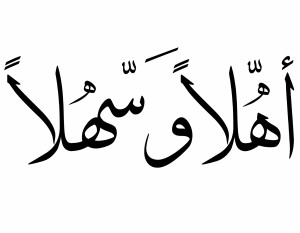السلام عليكم و رحمة الله
We’ve gone into what counts as “proper speech”. Now we’re going to look at the three kinds of words in Arabic.
From the Ajurroomiyyah:
وَأقْسَامُهَا ثَلاثَةٌ: اسْمٌ وَفِعْلٌ وَحَرْفٌ جَاءَ لِمَعْنىً
And its (i.e. speech) divisions are three: اسم (ism), فِعْل (fi’l) and حَرْف (harf) that comes to give a meaning.
There are three kinds of words. We’ll go a little more into each, but they are:
- اسْم (Noun)
- فِعْل (Verb)
- حَرْف (Particle)
That’s it. You will never find an Arabic word that isn’t one of these three. First, we’ll look at اسم’s
The اِسْم (Noun)
Like an English noun, an اسم can be a person, place, thing, idea or even more, but it’s really any word that gives a meaning by itself that is not associated with any time period (you’ll know what that underlined part means when we look at verbs, so don’t sweat it for now). Some examples are:
- ٌمُحَمّد (Muhammad)
- عَلِيّ (Ali)
- ٌرَجُل (a man)
- جَمَلٌ (camel)
- نَهَرٌ (river)
- تُفاحة (apple)
- ليمونة (lemon)
- عَصاً (stick/staff)
Each one of these words indicates a meaning by itself (i.e. you hear it and you know what it means) and the meaning of that word is not attached to any time frame (past, present or future).
Some more examples:
- كِتاب (book)
- قَلَم (pen)
- دَواة (socket)
- كُرّاسَة (notebook)
- جَرِيدَة (newspaper)
- خَلِيل (friend)
- صالِح (righteous)
- عِمران (Imran)
- وَرَقَة (sheet)
- سَبُع (predator)
- حِمار (donkey)
- ذِءب (wolf)
- فَهد (lynx/panther)
- بُرتُقالَة (orange)
- وَردَة (rose)
- هؤلاء (these)
- أَنتُم (you all)
Next comes the فعل (verb) إن شاء الله
Questions to consider
- What is an اسم ?
- Give 5 examples of an اسم
Until next time, السلام عليكم و رحمة الله و بركاته
Like this post? Simply enter your e-mail and click “Yes, include me!” for updates
Nice explanation!
This is quiet awesome…Maashaa Allah!